Related Research Articles
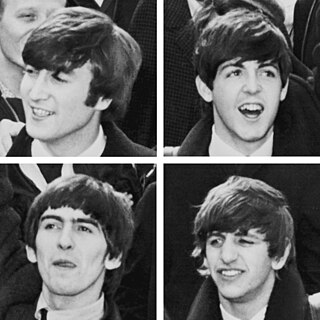
The Beatles were an English rock band formed in Liverpool in 1960, comprising John Lennon, Paul McCartney, George Harrison and Ringo Starr. They are regarded as the most influential band of all time and were integral to the development of 1960s counterculture and the recognition of popular music as an art form. Rooted in skiffle, beat and 1950s rock 'n' roll, their sound incorporated elements of classical music and traditional pop in innovative ways. The band also explored music styles ranging from folk and Indian music to psychedelia and hard rock. As pioneers in recording, songwriting and artistic presentation, the Beatles revolutionized many aspects of the music industry and were often publicized as leaders of the era's youth and sociocultural movements.
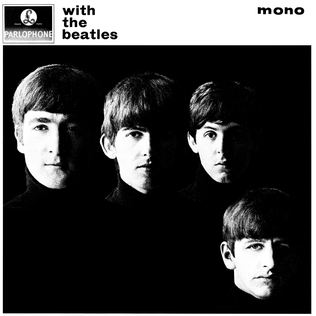
With the Beatles is the second studio album by the English rock band the Beatles. It was released in the United Kingdom on 22 November 1963 on Parlophone, eight months after the band's debut Please Please Me. Produced by George Martin, the album features eight original compositions and six covers. The sessions also yielded the non-album single, "I Want to Hold Your Hand" backed by "This Boy". The cover photograph was taken by the fashion photographer Robert Freeman and has since been mimicked by several music groups. A different cover was used for the Australian release of the album, which the Beatles were displeased with.
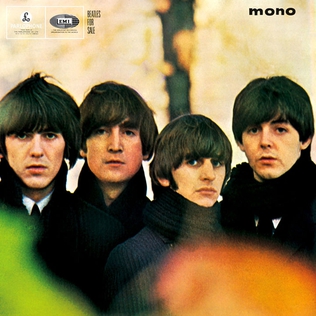
Beatles for Sale is the fourth studio album by the English rock band the Beatles. It was released on 4 December 1964 in the United Kingdom on EMI's Parlophone label. The album marked a departure from the upbeat tone that had characterised the Beatles' previous work, partly due to the band's exhaustion after a series of tours that had established them as a worldwide phenomenon in 1964. Beatles for Sale was not widely available in the US until 1987, when the Beatles' catalogue was standardised for release on CD. Instead, eight of the album's fourteen tracks appeared on Capitol Records' concurrent release, Beatles '65, issued in North America only.
"Being for the Benefit of Mr. Kite!" is a song recorded by the English rock band the Beatles for their 1967 album Sgt. Pepper's Lonely Hearts Club Band. It was written and composed primarily by John Lennon and credited to Lennon–McCartney.

"You're Going to Lose That Girl" is a song by the English rock band the Beatles from their 1965 album and film Help! Credited to the Lennon–McCartney songwriting partnership, the song was mostly written by John Lennon with contributions from Paul McCartney.
"Mr. Moonlight" is a song written by Roy Lee Johnson and recorded by Dr. Feelgood and the Interns. The song was covered by the Beatles on their 1964 albums Beatles for Sale and Beatles '65.

"Honey Don't" is a song written by Carl Perkins, originally released on January 1, 1956 as the B-side of the "Blue Suede Shoes" single, Sun 234. Both songs became rockabilly classics. Bill Dahl of Allmusic praised the song saying, "'Honey Don't' actually outclasses its more celebrated platter-mate in some ways." It has been covered by more than 20 other artists, including the Beatles, Ronnie Hawkins and Johnny Rivers. The song has appeared in the films Prince of Tides, Diner, and Perfect Sisters.

"What You're Doing" is a song by the English rock band the Beatles from their album Beatles for Sale, released in December 1964. It was written by Paul McCartney, although credited to Lennon–McCartney. The song was one of eight original compositions on Beatles for Sale. In North America, where Capitol Records typically altered the content of the band's albums, "What You're Doing" instead appeared on the 1965 US release Beatles VI.
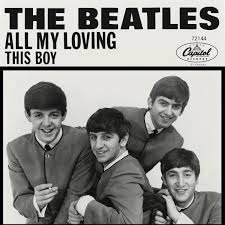
"All My Loving" is a song by the English rock band the Beatles, from their second UK album With the Beatles (1963). It was written by Paul McCartney, and produced by George Martin. Though not officially released as a single in the United Kingdom or the United States, the song drew considerable radio airplay, prompting EMI to issue it as the title track of an EP. The song was released as a single in Canada, where it became a number one hit. The Canadian single was imported into the US in enough quantities to peak at number 45 on the US Billboard Hot 100 in April 1964.

"Don't Bother Me" is a song by the English rock band the Beatles from their 1963 UK album With the Beatles. It was the first song written by George Harrison, the group's lead guitarist, to appear on one of their albums. A midtempo rock and roll song, it was originally released in the United States on the 1964 album Meet the Beatles!
"You Know What to Do" was the second song written and recorded by George Harrison with the Beatles. It was recorded on 3 June 1964 but remained unreleased until its inclusion on the band's 1995 outtakes compilation Anthology 1.
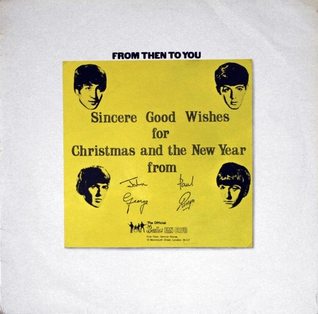
From December 1963 to December 1969, English rock group the Beatles sent out spoken and musical messages on flexi disc to members of their official fan clubs in the United Kingdom (UK) and the United States (US) each Christmas. An LP compilation of all seven, titled From Then to You in the UK and The Beatles Christmas Album in the US, was sent out in 1970.
Harrisongs Ltd is a music publishing company, founded in 1964 by English musician and songwriter George Harrison, then a member of the Beatles. On 11 September 1964, Harrison created Mornyork Ltd, which, by 7 December that year, had changed its name to Harrisongs Ltd. The company is headquartered at 27 Ovington Square in London's Knightsbridge district, in the same building that houses the Beatles' Apple Corps.

"Kansas City" is a rhythm and blues song written by Jerry Leiber and Mike Stoller in 1952. First recorded by Little Willie Littlefield the same year, as "K. C. Loving", the song later became a chart-topping hit when it was recorded by Wilbert Harrison in 1959. "Kansas City" is one of Leiber and Stoller's "most recorded tunes, with more than three hundred versions", with several appearing in the R&B and pop record charts.

In His Own Write is a 1964 nonsense book by English musician John Lennon. His first book, it consists of poems and short stories ranging from eight lines to three pages, as well as illustrations.
"I'll Be on My Way" is a song written by Paul McCartney, credited to Lennon–McCartney, first released on 26 April 1963 by Billy J. Kramer with the Dakotas as the B-side of their hit debut single "Do You Want to Know a Secret", a song also written by Lennon–McCartney. The single reached number two in the UK charts while "From Me to You" by the Beatles occupied the number 1 position. The Beatles recorded a version of the song on 4 April 1963 for BBC radio, first released on the 1994 compilation album Live at the BBC.

"Christmas Time (Is Here Again)" is a Christmas song by the English rock band the Beatles, originally recorded for their fifth fan club Christmas record, Christmas Time Is Here Again! (1967). One of the few Beatles songs credited to all four members of the band, it consists of a blues based backing track as well as double-tracked vocals sung by them, George Martin and Victor Spinetti. The lyrics are mostly made up of the song's title refrain, repeated across nine verses.
The Beatles were a rock group from Liverpool, England. This timeline chronicles their activities.
Sibylla's was a nightclub in the West End of London that operated from 1966 to 1968. It was located at 9 Swallow Street, on the edge of Mayfair and close to Piccadilly Circus. The club's launch on 22 June 1966 was attended by many artists and celebrities, including the Beatles, members of the Rolling Stones, Michael Caine, Julie Christie, David Bailey and Mary Quant. Like the Ad Lib and the Scotch of St. James, the club was a popular meeting place for rock musicians and other artists until trends changed in the London scene.
References
- 1 2 David Hockney (15 September 1995). David Hockney. Manchester University Press. p. 20. ISBN 978-0-7190-4405-2.
- 1 2 Andrew Loog Oldham (25 August 2014). Rolling Stoned. Gegensatz Press. p. 366. ISBN 978-1-933237-84-8.
- 1 2 Piet Schreuders; Mark Lewisohn; Adam Smith (25 March 2008). Beatles London: The Ultimate Guide to Over 400 Beatles Sites in and Around London. Pavilion Books. p. 9. ISBN 978-1-906032-26-5.
- ↑ Nancy J. Hajeski (1 October 2014). The Beatles: Here, There and Everywhere. Thunder Bay Press. p. 201. ISBN 978-1-62686-274-6.
- ↑ Barry Miles (27 October 2009). The Beatles Diary Volume 1: The Beatles Years. Omnibus Press. p. 272. ISBN 978-0-85712-000-7.
- 1 2 Joe Goodden (2017). Riding So High: The Beatles and Drugs. Joe Goodden. p. 98. ISBN 978-1-9998033-1-5.